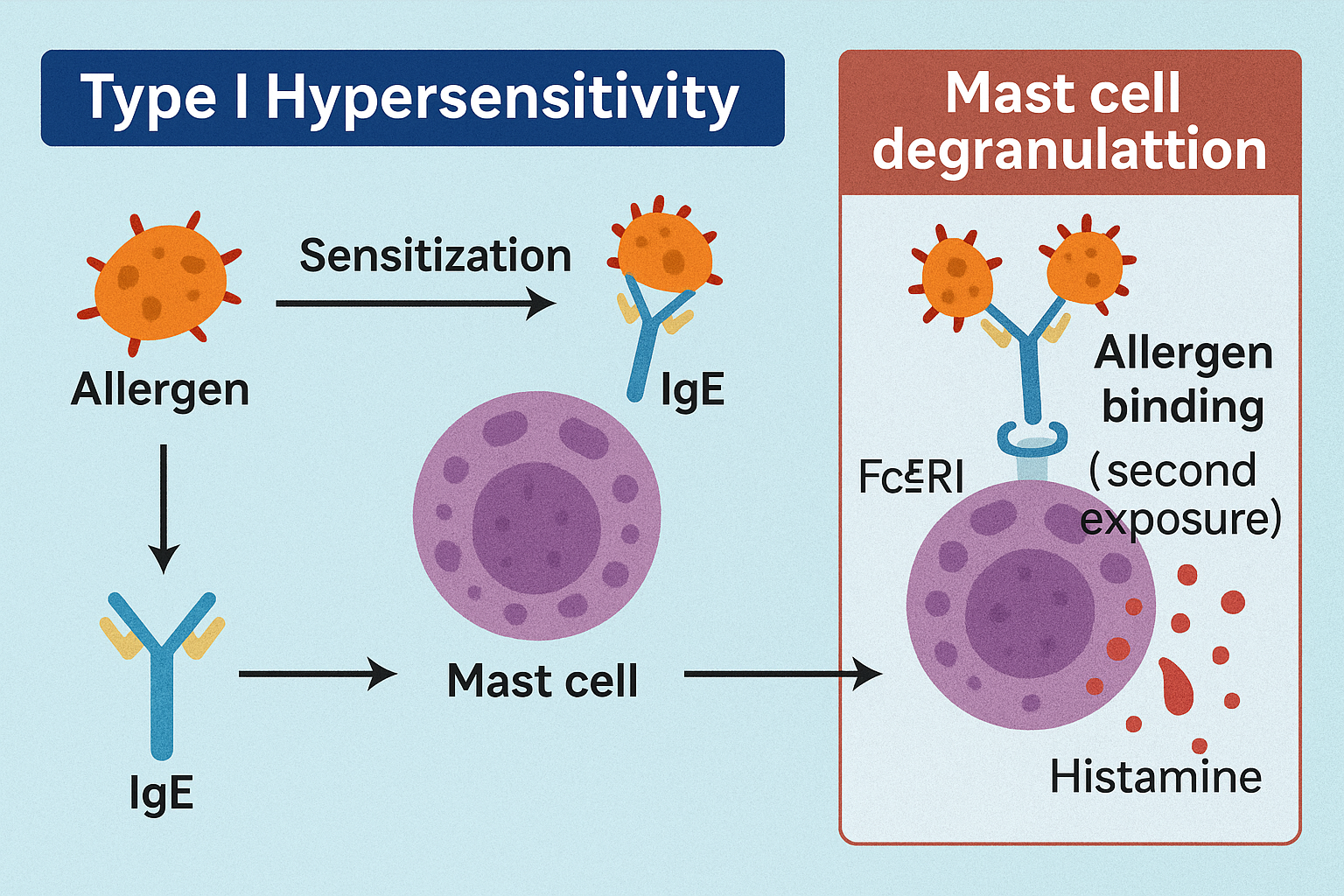🧠 Type I Hypersensitivity Reactions: Fast, Furious, and Fully Testable
USMLE Step 1 loves to test the four types of hypersensitivity reactions—and Type I is the fastest, flashiest, and deadliest if you miss it.
Whether it's peanut allergies, bee stings, or penicillin-induced anaphylaxis, you’ll encounter Type I reactions across immunology, microbiology, and pharmacology.
Let’s break it down with Step 1-focused language, key clinical examples, and a visual mnemonic to anchor it all.
⏱️ What Makes It "Type I"?
| Feature | Description |
|---|---|
| Timing | Immediate (< 30 minutes) |
| Antibody | IgE |
| Cells Involved | Mast cells, Basophils |
| Mediators | Histamine, Leukotrienes, Prostaglandins |
| Requires Sensitization? | ✅ Yes (prior exposure needed) |
This is the only hypersensitivity reaction that is immediate and IgE-mediated, making it very easy to spot on boards when paired with classic symptoms like hives, bronchospasm, and hypotension.
🧬 Step-by-Step: The Mechanism
Sensitization Phase (1st exposure)
Allergen (e.g., pollen) is detected by antigen-presenting cells
B cells class-switch to produce IgE
IgE binds to FcεRI receptors on mast cells and basophils
Activation Phase (2nd exposure)
Allergen cross-links surface-bound IgE
Mast cell degranulation occurs
Rapid release of:
Histamine → vasodilation, itching, bronchospasm
Leukotrienes → prolonged bronchoconstriction
Prostaglandins → vasodilation, pain
🩺 Classic USMLE Presentations
📌 Anaphylaxis:
Trigger: Bee sting, peanuts, penicillin
Rapid onset: Hypotension, wheezing, rash
Life-threatening → treat with epinephrine IM
📌 Allergic Rhinitis / Hay Fever:
Pollen → sneezing, itchy eyes
Tx: Antihistamines
📌 Asthma (extrinsic):
Triggered by allergens
Treat with β₂-agonists and inhaled corticosteroids
📌 Urticaria (Hives):
Local skin reaction with wheals and itching
🧠 Mnemonics to Remember
“A” for Allergic and Anaphylactic
Asthma
Allergic rhinitis
Anaphylaxis
All are Type I
🧪 Bonus: Type I = First and Fastest hypersensitivity type
💊 Drug Associations to Know
Penicillin → classic board question allergen
Contrast dye → non-IgE, but mimics anaphylaxis ("anaphylactoid")
Latex, shellfish, nuts → must know!
🎯 Call-To-Action
Want more immuno cheatsheets and visual flashcards?
🧠 Practice with adaptive, gamified quizzes in the KOTC app:
🔗 https://kingofthecurve.org/trial-sessions
🎓 Upgrade to lifetime access for all allergy and immune visuals:
🔗 https://kingofthecurve.org/free-lifetime
Frequently Asked Questions (FAQs)
-
Aim for 4-6 focused hours, ensuring you incorporate breaks to avoid burnout.
-
Practice mindfulness techniques, take practice exams under realistic conditions, and maintain a balanced lifestyle.
-
Set short-term goals, seek support from mentors, and reward yourself for small achievements.
-
Regular exercise improves focus, reduces stress, and enhances overall mental clarity.
-
KOTC offers personalized learning tools, gamification features, and adaptive question banks to help students stay on track without burnout.


